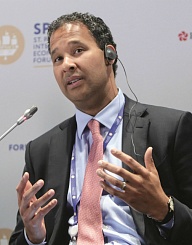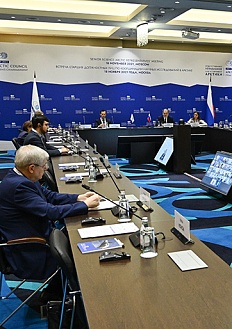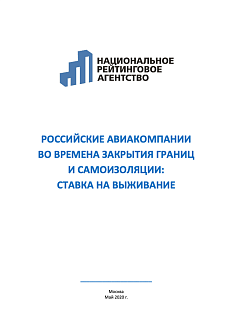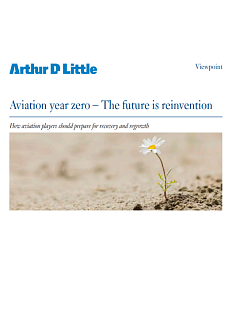“Politics is transformed in the face of the vast frontiers of space”

What innovations does the world need?
Naturally, we focus on aerospace when it comes to innovation. There is a convergence of several key enabling technologies, which when integrated together in new ways will unlock the next several steps our industry takes forward. Only time will tell whether these steps will first be in autonomous flight, digitization, electrification, artificial intelligence aided operations, biofuel propulsion — or more likely a combination of factors. But we are investing aggressively in these technologies so as to harness the good they offer for our customers.
In addition to the incremental progress we steadily make in commercial air transport, there is an ever greater likelihood of disruption in related fields such as urban mobility. Barriers to entry in these fields are becoming lower. We see an array of companies traditionally outside of aerospace, such as Google, Uber and Amazon, trying to enter the arena. Their emergence helps fuel all the talk about the future of flying cars and the like. We are making investments in disruptive mobility all across our enterprise, from cargo operations, to defense and security applications, to personal urban mobility. Last year, we launched our Horizon X division, which is making investments in disruptive mobility along with other disruptive aspects of aerospace development.
It is also impossible to ignore the reignited energy and anticipation around space exploration. It has grown rapidly in the last several years. That’s not only true within industry — and with all sizes of companies getting involved, which is exciting to see — but also at NASA, which just recently saw its program funding renewed and expanded for the first time since 2010.
Critical to our future in space is the normalization of space access and management of space debris and standards. Global collaboration will be necessary to ensure that a future of routine, low-cost space travel is safe enough and easy enough to enable a new space economy supporting future generations of research, commercial operations, and even tourism.
What should the world’s leaders agree on?
Space is a critical area for global leaders to agree on for the future of humanity. Global collaboration, research, and joint operations in low earth orbit can help normalize space access and regular travel to orbit. Without it, the promised advances in this field are unlikely to emerge. Accordingly, I would like to see the pace of global collaboration increase in these areas.
The collective benefits promised by expanded commercial activity onboard the International Space Station are tremendous. The historic collaboration of our nations and companies on the ISS remains a gold standard. The amazing men and women who have crewed the ISS day after day for all these decades, have proven that boundaries and politics are transformed in the face of the vast frontiers of space. For over 20 years, the ISS has offered scientists a one-of-a-kind platform for exploration and investigation, while continuing to teach us how humans will not just survive, but thrive in deep space.
Together we have the drive, direction, leadership, and technology required to explore. We have achieved breakthrough discoveries. Working together, we’ll help humankind explore ever deeper into space and play a leadership role on the journey to Mars.
What is your economic forecast until 2030?
In commercial aviation, Boeing projects a $6.1 trillion market for nearly 41,030 new airplanes over next 20 years, with total airplane demand rising 3.6 percent over last year’s forecast. From 2017-2036, Boeing projects deliveries of 29,530 single-aisle airplanes; 5,050 small wide-body airplanes (200-300 seats); 3,160 medium wide-body airplanes (300-400 seats); and 920 freighter wide-body airplanes.
While the order cycle will fluctuate year to year, we are in a fundamentally sound market over the long term. Worldwide air travel has grown at a historically brisk pace. Year-over-year passenger travel growth for the past five years has averaged 6.2%. Low air fares, higher living standards with a growing middle class in large emerging markets, and the growth of tourism and travel relative to total consumer spending in major economies are contributing factors. We’re seeing 100 million new passengers per year in Asia alone. And by our estimates, less than 20% of the world’s population has ever taken a single flight so passenger growth still has a lot of headroom.
At the same time we are seeing strengthening in the freight cargo market with growth of 7.7% so far this year. That’s another encouraging sign for the industry and the global economy and we see long-term strength in that market with projected growth in trade and transport across all regions of the world. And some of that is being fueled with the rapid growth in e-commerce.
Boeing also expects the commercial aviation support market to be worth almost $8.5 trillion between 2017 and 2036. This includes all of the services required to support the operation of commercial aviation products around the world. Annual spend will more than double to more than $581 billion by 2036.
What would be your advice to entrepreneurs?
No matter what type of company you are starting — or indeed what size — it’s crucial to strive for continuous improvement and to always listen closely to your customers. Today, business excellence requires continuous redesign. Offering increasing levels of customer value is the key to generating the sustained return necessary to keep funding innovation and driving technology offerings forward. No business finds an end point to this journey of continuous improvement and product innovation. If you do, that’s likely the day you shut down your company! Instead, change and improvement have to be continuous, no matter how strong your lead in the race, how long you’ve been around, or how preferred your product currently is.
Even as a 100-year-old company in the aerospace industry with all the experience that brings, Boeing is evolving and innovating every day. We are driving the industry from a cyclical business model to a more long-term, sustained growth model. The increasingly global nature of our business is a factor; our six to seven year backlog is a factor; market dynamics are a factor. But above all, continuous innovation is delivering customers constant progress in the value proposition that enables them to keep offering consumers more travel for less expense, increasing global demand and growing the entire industry.
We are not — and will not — stand still. We’ll continue to make substantial investments in our people, products and services. We’ll continue to find ways to operate better and more efficiently while providing more value to our customers. Our aspiration is to be the best in aerospace and an enduring global industrial champion. Every entrepreneur should have similarly lofty goals.
What does «an economy of trust» mean to you?
Technology has created an impressive level of connectivity in our economy between strangers, organizations and companies all over the world. It saves time and money by conveying in an instant information, ideas and business opportunities. Yet as important as speed of communication is, trust remains still more important. Trust is the lubricant that enables partnerships, talent networks, customer acquisition and global market participation. Without any one of these, it is impossible to thrive in today’s globalized economy. These are needed even where commerce is online and between strangers. Witness that more market capitalization has probably been lost this past year in instances where public trust was broken, than in respect of any particular product or business model failure. Trust is, therefore, as much as ever the key ingredient for global business success and still sets the foundation for growth and prosperity in today’s economy. Where trust diminishes, friction grows, business cycles slow, customers leave and losses mount. Where it rises, virtuous cycles of productivity and shared value creation follow. Simply put, trust remains synonymous with success.
Anlytics on the topic

The meeting of the Senior Arctic Research Coordination Officials took place on 18 November in a hybrid format in Moscow. The format of the event involved remote participation by foreign delegations. It took place as part of the action plan for Russia’s chairmanship of the Arctic Council in 2021–2023, which is operated by the Roscongress Foundation.


The report by WIPO (World Intellectual Property Organization) analyzes patent, scientific publishing and other data to review past and current trends in artificial intelligence (AI), while offering insights into how innovation in this field is likely to develop in the coming years.

The study presents the expert opinion of specialists from Arthur D. Little on key modern challenges for aviation and promising areas of response to these challenges.

